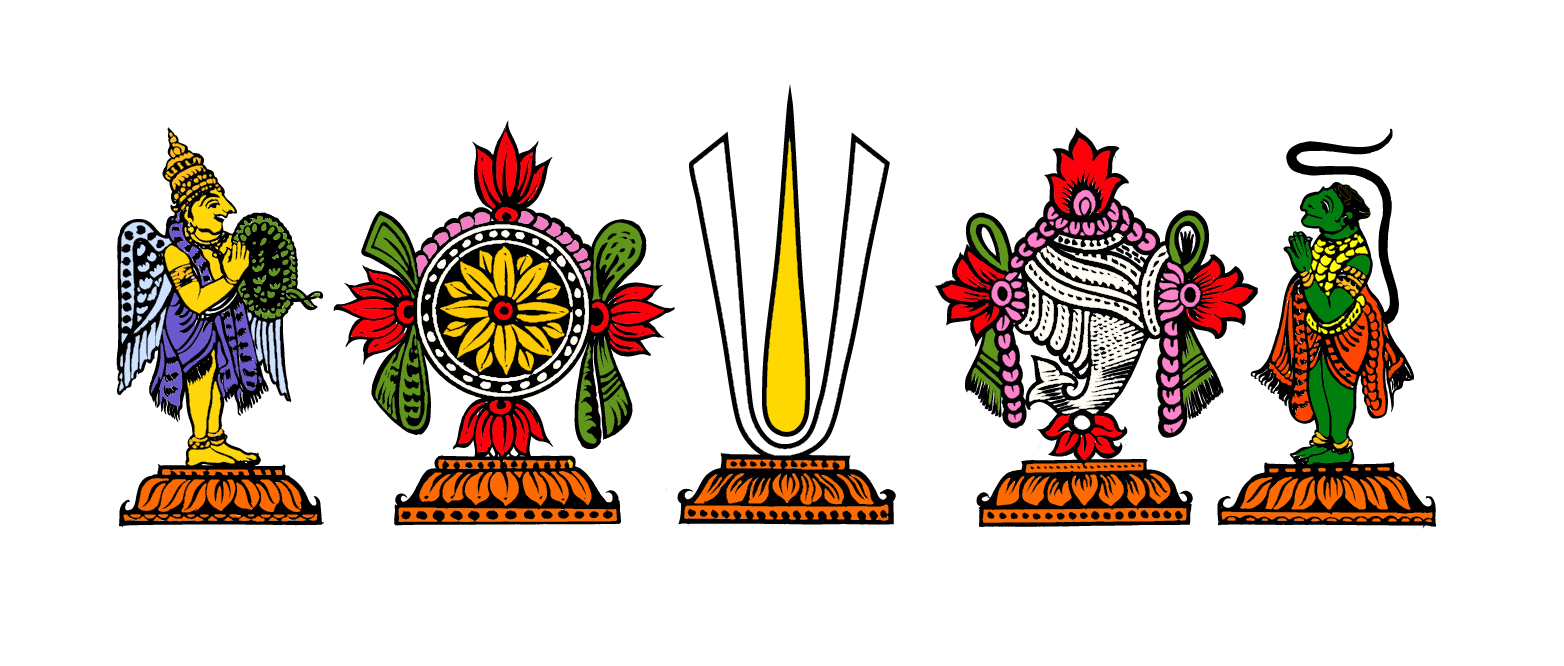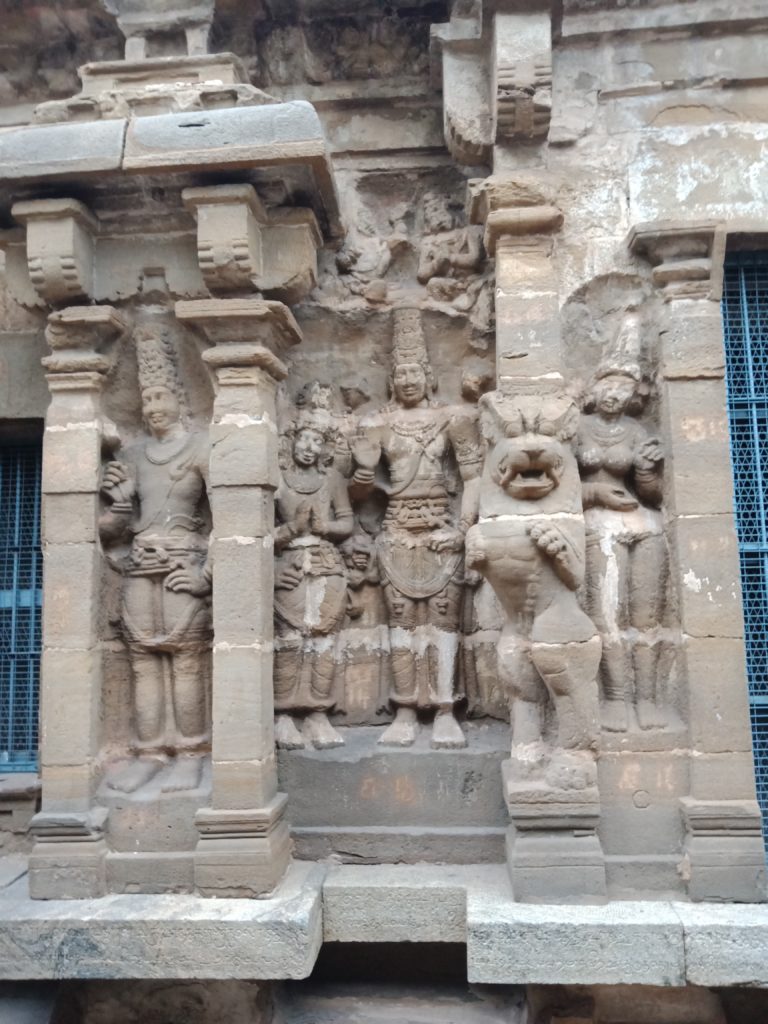Originally published in Desika Seva
When someone approaches elders for blessings before commencing anything, they wish him ‘Godspeed’. By this word, they convey their good wishes for his success. They invoke God’s blessings on him and also wish that he speedily achieves whatever he wants.
When someone approaches the supreme Lord for His grace in a true and sincere manner, He does not merely wish him well but also acts speedily Himself. We have examples of Gajendra and Prahlada to show His swiftness in coming to the rescue of His devotees.
Let us first take the case of Gajendra. Sri Parasara Bhatta has described, in a vivid manner, the speed with which the Lord came out from paramapada and saved the elephant (vide Sri Rangarajastava Uttara-sataka 56-59).
As soon as He heard the plaintive cry of the elephant, He hastily drew away His feet from the massaging hands of His two Consorts, sprang out of His couch, widened His eyes and removed the saffron marks on His chest left by Goddess Lakshmi’s embrace.
He put on His ornaments, dress and weapons in a haphazard manner and dashed forth, even ignoring the outstretched hand of Vishvaksena offered to steady Him. He forgot to put on His sandals and jumped on Garuda’s back without setting the saddle right.
Sensing the urgency of the Lord, Garuda began flying at a terrific speed, but this was not enough for Him. He jabbed at Garuda’s sides with His feet and shouted at the bird to fly faster. Even when Garuda increased his speed, the Lord raised Himself in His seat, urging for more speed. He calmed down only after He had reached the spot and sliced off the crocodile’s jaw which held Gajendra’s leg.
Sri Parasara Bhatta says that the elephant’s appeal for help had this remarkable effect on the Lord. Describing the Lord as ‘a lotus pond agitated by a storm’, Sri Bhatta pays homage to the Lord’s speed – ‘bhagavatastavaraayai namaha’.
Sri Vedantadesika enjoys the Gajendra-rakshana in a different way. In the very first verse of the Ashtabhujashtaka, he extols the compassion of the Lord in rushing to the rescue of the elephant caught by a crocodile (gajendra rakshaatvaritam bhavantam… apaara vijnaana dayaanubhaavam). In the last verse, he hints that, on hearing the elephant’s cry, the Lord doubled His arms and snatched eight weapons from His armoury, not knowing which He may have to use in saving the elephant. While His normal four arms suffice to bless His devotees, He thought He needed eight arms to deal with the enemies of His devotees.
Then there is the classic case of the Narasimha-avatara the Lord took to save Prahlada. When He heard the angry Hiranyakasipu shout at his son, “Show me where your Narayana can be found”, the Lord assumed myriad forms and stationed Himself in every object in the universe, for in anticipation that Hiranyakasipu could strike anywhere.
Moreover, since He had to conform to the boon secured by the demon from Brahma that he would not be killed by either man or beast or by any weapon, the Lord could not appear in His usual forms. So He quickly changed into a Man-Lion form by assuming the face of a roaring lion replete with mane and fangs with nails on His fingers.
He did not even wait to change His normally soft and compassionate lotus eyes.
Such was His hurry to save Prahlada. It is significant that Rukmini addresses Lord Krishna as ‘Nrsimha’ in her message to Him, hinting thereby that He must make a similar instantaneous appearance, just like Narasimha, and take her away.
But there are at least two occasions when the Lord did not show this much expedition in fulfilling His devotees’ prayers. The first is the case of Bharata, who fell at Rama’s feet and prayed Him to return to Ayodhya. What held Sri Rama back from acceding to Bharata’s request was not only his word to Kaikeyi that He will spend fourteen years in the forest but his much earlier assurance to the celestials that He would remove the scourge of Ravana and his men from the face of the earth and make it safe for good people to live peacefully.
He therefore gave Bharata an insignia of His i.e. His padukas, as a substitute, with a guarantee that He will return to Ayodhya exactly after fourteen years to the minute. And He kept His word too. Soon after He killed Ravana and was blessed by the gods and His father Dasaratha, His mind turned towards Bharata and Ayodhya.
He told Vibheeshana that He wanted to return to Ayodhya immediately. He said, “Bharata is eating his heart out to meet me. I have no reason to delay here any further. Delay would mean that Bharata would enter fire and end his life. My mind is speeding towards Bharata” (tam tu me bhraataram drashtum bharatam tvarate manaha).
Taking the aerial car (pushpaka vimana) supplied by Vibheeshana, Rama did reach Ayodhya in the nick of time, even as Bharata was completing his third round circling the fire before plunging into it. The Lord’s speed was evident here.
The other case of apparent ‘delay’ in offering refuge happened in the case of Vibheeshana. The Ramayana records that Vibheeshana was not ‘accepted’ immediately by Sri Rama when he flew in with his four ministers. There was a debate among the monkeys whether to accept him or not. Only Hanuman spoke in favour of admitting Vibheeshana, while all others were telling that he should not be, as he was from the enemy camp.
After listening to all their views, Sri Rama declared that He will protect all those who surrendered to Him (the famous Sri Rama Charamasloka). At the end, He declared, “Bring in Vibheeshana; I have already accepted his surrender”.
Note the word ‘already’. It shows that, as soon as Vibheeshana came and said, “I seek refuge in Sri Rama”, his surrender was mentally accepted by Him. All that remained was to announce it to Sugreeva and others. Sri Rama then made Sugreeva himself bring Vibheeshana to Him. Sri Rama had to bide His time, educate them and make them understand His real nature and intentions. Hence it is said that, in Vibheeshana’s case, there was only apparent delay and not actual delay.
Another instance of ‘apparent’ delay was in the protection of Draupadi’s modesty when she was being disrobed in the assembly. Though He did not appear in person in response to Draupadi’s appeal, Lord Krishna ensured that she was ‘infinitely’ clothed and there was no question of disrobing her.
Much later, He says about this, “Draupadi’s call for help is still weighing heavily on my mind like an unpaid debt with increasing interest”. He had to wait for the appropriate time to strike at the evil Kauravas. This was hardly the occasion. Anger at the humiliation would have to smoulder in Draupadi’s heart and in the hearts of the Pandavas; hatred for the Pandavas should assume gigantic proportions in the hearts of the Kauravas to the extent of Duryodhana declaring that ‘he will not give even five needle point lands to the Pandavas’. Many years should roll by before the mutual enmity can reach the flashpoint.
Moreover, Lord Krishna had come down to the earth to ‘rid the world of excess weight of people’. So He waited for twelve long years for the cataclysm of war between the groups in which almost the entire human population could be wiped out. Meanwhile, He had ‘accepted’ the surrender of Draupadi and protected her from all evils on all future occasions whenever she was troubled. And, for her sake, He protected the Pandavas too. Here too, the cry of surrender was speedily accepted, but was acceded to at the appropriate time.
Thus, God’s speed in coming to the rescue of those who cry out for His help is unimaginable. If our cry is sincere and spontaneous, His help is instantaneous. He will ever act in the interests of His devotees. This is the essence of the Visishtadvaita philosophy as brought out by the Alvars, Sri Ramanuja and Sri Desika.


